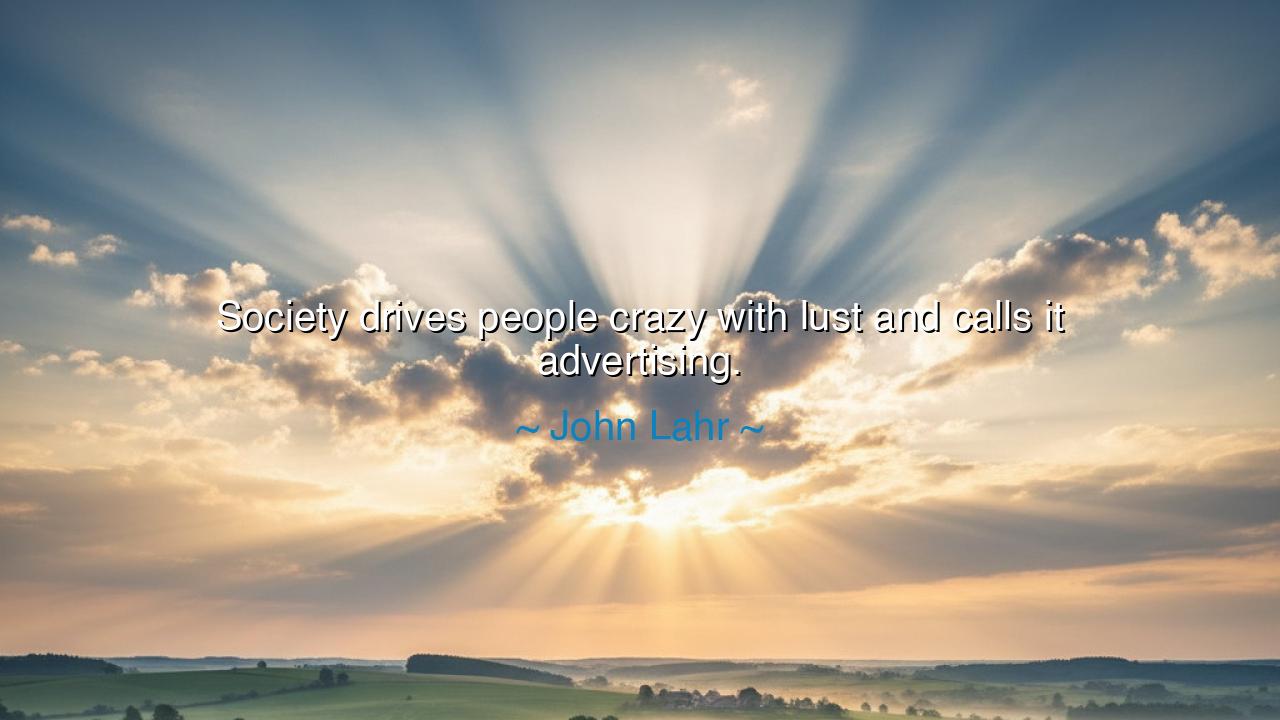
Society drives people crazy with lust and calls it advertising.






Hear the biting words of John Lahr, who proclaimed: “Society drives people crazy with lust and calls it advertising.” This utterance, sharp as a sword, cuts through the veils of modern illusion. It unmasks the ways in which society, in its hunger for wealth, manipulates desire and baptizes it with the name of commerce. What is called advertising is often nothing but the cultivation of endless yearning—yearning not for truth, nor for goodness, but for possessions, for images, for the fleeting fires of consumption. And this yearning, once stoked beyond measure, drives men and women alike into frenzy, into envy, into the madness of always wanting more.
The origin of this thought lies in Lahr’s reflections as a critic of culture and theater. He observed how the stage of modern life is dominated not by philosophers or poets, but by merchants of desire. Instead of elevating the human spirit, many forms of advertising inflame the body, stir lust, and twist natural longing into chains of consumption. Lahr’s words expose the paradox: the very systems that claim to entertain, inform, and inspire are often those that corrupt, distract, and enslave.
The ancients, too, warned of this danger. The Roman poet Juvenal lamented the people’s obsession with “bread and circuses,” where rulers pacified citizens with spectacle rather than nourishing their souls. What Lahr describes is the modern echo of this old trick: society cloaking manipulation in the innocent guise of advertising, yet secretly bending human desire to serve the engines of profit. The people are promised happiness, yet are left restless, unsatisfied, forever craving what they do not have.
History offers a vivid example in the rise of tobacco advertising in the twentieth century. Cigarettes were sold not as sticks of poison, but as symbols of glamour, freedom, and allure. Billboards and magazines showed radiant women and powerful men, their beauty tied to smoke. An entire generation was enticed into addiction by this lust, packaged as sophistication. Decades later, when the health toll became undeniable, society finally recognized that it had been deceived. Here we see Lahr’s warning embodied: lust sold as advertising, madness disguised as culture.
The meaning of this quote, then, is a call to awareness. It reminds us that not all that glitters is gold, and not every voice in society seeks our good. We are surrounded by images and words designed to stir longing, to unsettle our peace, to tell us that we are never enough until we buy, consume, or indulge. To call this advertising is to sanitize it, to make respectable what is essentially manipulation. The madness is not in desire itself, but in the way it is exploited, redirected, and multiplied until human beings are no longer free, but bound to cycles of endless want.
What lesson, then, must we take? That we must guard our minds and hearts as fiercely as a warrior guards his gates. We must learn to discern between true needs and manufactured cravings, between desires that uplift and desires that enslave. Parents must teach children to see behind the glittering veil of slogans; individuals must pause before every purchase and ask: “Is this my true longing, or a lust planted in me by another?” By cultivating such awareness, we reclaim our freedom from the madness of manipulation.
Therefore, children of the future, engrave this wisdom upon your hearts: society may cloak manipulation in beauty, but you must not be deceived. See lust for what it is, and advertising for what it does. Seek not the restless hunger stirred by others, but the quiet satisfaction that comes from truth, simplicity, and love. For in this vigilance lies your freedom, and in this freedom lies the true wealth of the soul—untouched by the madness that others would sell to you as normalcy.






AAdministratorAdministrator
Welcome, honored guests. Please leave a comment, we will respond soon